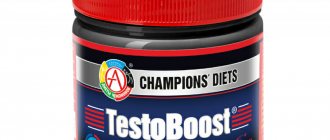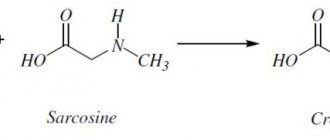Home » Mass gain » Gainers » What is better, gainer or protein?
GainersProtein
Sports nutrition is so diverse that not every athlete can understand it. The main difficulty is not in choosing the most suitable nutritional supplements among the many products produced by different manufacturers, but in the ability to correctly combine different types of additives.
Beginning athletes are often interested in: what is better to choose - protein or gainer? This issue is shrouded in many myths, so it should be understood in more detail.
Differences between protein and gainer
Protein is pure protein. For its production, products such as milk, whey, eggs or soy are used, which are purified from unnecessary substances. The English word “protein” is translated as “protein”. Protein acts as the main building material for muscles. It makes no sense to pay attention to questions about whether protein is beneficial or harmful for humans, but it is undoubtedly worth considering its benefits:
- Highly digestible;
- Stabilizes nitrogen balance;
- Helps strengthen the immune system;
- Provides the body with essential amino acids.
There are two types of proteins - slow and fast. Slow is absorbed at a slow pace, gives a small increase in muscle mass, but acts for a long time. Good for drying. Fast protein is absorbed quickly, acts within a short period of time, and provides maximum weight gain.
Therefore, in the process of building muscle, it is better to start with fast protein and gradually switch to slow protein. Contraindications to the use of protein are individual protein intolerance and serious kidney disease (renal failure). Gainer is a dry protein-carbohydrate mixture, consisting on average of 10-20% proteins and 70-80% carbohydrates, stimulating weight gain and restoring energy reserves body. This is the difference between these supplements. There are different cocktails in which the ratio between proteins and carbohydrates can vary from 10%/80% to 40%/50%. Gainer benefits:
- Restores glycogen reserves;
- Provides the necessary energy;
- Increases performance, increases strength growth;
- Promotes overall recovery of the body and restoration of muscle tissue during sleep.
To gain the required shape you need a balanced intake of proteins and carbohydrates, i.e. protein and gainer.
The carbohydrates included in gainers are simple (high glycemic index) and complex (low glycemic index). It is better to take them:
- People with high metabolism;
- Those with a thin build (ectomorphs, asthenics);
- Professionally involved in sports and at the same time leading an active lifestyle;
- Teenagers;
- In the absence of a regulated power supply.
Considering the difference between a gainer and protein, it is not recommended for people prone to obesity and rapid weight gain.
Gainers in bodybuilding
Gainer, unlike protein, contains two macronutrients at once - proteins and carbohydrates. Accordingly, it has a significant energy density. The classic proportions are 60% carbohydrates and 40% protein, but they may vary in products from different manufacturers. A protein-carbohydrate cocktail for weight gain may additionally contain BCAA, other amino acids and vitamins.
There are three types of gainers:
- low-calorie – up to 500 kcal;
- average calorie content –500-700 kcal;
- high-calorie - from 700 to 1000 kcal in one recommended serving.
It contains the same protein - whey, casein or vegetable, but in smaller quantities, but carbohydrates can be either simple or complex. Regular sugar or fructose is used as simple carbohydrates - this is the most affordable option for a cocktail, but the most useless in the long term. A good option is a product with a combination of simple and complex carbohydrates, high-quality protein and creatine. For example, Gainer with casein and amino acids
The percentage of macronutrients can shift towards carbohydrates - up to 80% versus 20% protein.
Who can take it?
A gainer for gaining muscle mass is the choice of people with an asthenic physique. Most often, such cocktails are used specifically for weight gain, as they have a high calorie content.
Please note: the main difference between a gainer and a protein is the presence of carbohydrates and high energy density. It can be consumed to increase the daily calorie intake for people with poor appetite in addition to main meals.
It is recommended to drink a gainer in three cases:
- for weight gain - for a thin athlete;
- to quickly recover after training;
- as a source of additional energy - before training.
Pre-workout use is only justified for people of thin build (asthenic type). For other athletes, it is advisable to replace the gainer with a lower-calorie pre-workout complex containing creatine.
Recommendations for admission
You can take the gainer to gain muscle for an ectomorph three times a day:
- on an empty stomach;
- 2 hours before training;
- immediately after training to close the protein-carbohydrate window.
Three servings will increase your daily caloric intake by at least 1500 kcal. For most people, it is advisable to drink a gainer only after a workout in order to quickly restore lost energy and start the anabolism process.
The difference between a gainer and a protein
To understand the difference between a gainer and a protein, you need to know what a gainer is. If everything is clear with protein, it is protein almost in its pure form, and often in an easily digestible form, then a gainer is a more complex thing. The difference between gainer and protein is that gainer is more complex in its composition and even “more meaningful”. This is a mixture in a certain proportion of the same protein as in protein mixtures, but the main component is still a carbohydrate mixture. Gainers always contain a lot of carbohydrates, which are designed to restore the athlete’s energy in a short time. The difference between gainer and protein is that protein contains no carbohydrates at all, but some gainers may contain a minimum of protein. Gainer is undeservedly rejected due to the false prejudice of novice athletes. The word “carbohydrate” itself makes it difficult to figure out which is better, a gainer or a protein. It is associated with calories, sugar and fat gain. But in fact, the body simply needs carbohydrates.
Carbohydrates are the second most important component of the process of building muscle tissue. After training, muscles are in a tense and exhausted state. To repair and grow, they need to absorb protein, but the process of protein absorption never begins before the muscles are saturated with the required amount of glycogen.
And this is the main difference between a gainer and a protein - a gainer can be a source of glycogen, while protein never can. An imbalance of these two substances is acceptable in the body only when you are faced with the task of getting rid of fat as much as possible and losing weight, but at the same time you simply cannot count on any noticeable growth in muscle mass. Now that the difference between gainer and protein in terms of composition is clear, it’s worth understanding the concentrations and proportions. Like protein, a gainer can contain different amounts of the effective substance in the total mass of the supplement.
The cheaper the gainer itself, the more foreign impurities it contains, which make preparation and use easier, and at the same time increase the useless mass of the product. And this is exactly the point where there is no difference between a gainer and a protein: you need to choose a gainer in the same way as a protein, that is, one that contains eighty-five to ninety-five percent of the effective substance. Then you should pay attention to the percentage of proteins and carbohydrates. When choosing for yourself which is better, a gainer or a protein, proceed from the fact that during high-intensity training it will not be possible to compensate for the lack of protein in the body with a gainer alone. If your goal is a quick gain of muscle mass and active muscle growth, then you will still have to drink additional protein. The most optimal composition of a gainer is considered to be thirty-five percent protein and fifty-five percent carbohydrate.
What is the difference
Protein is pure protein, made from milk, whey, eggs or soy, and is the building material for muscles.
Protein:
- well absorbed;
- normalizes nitrogen balance in the body;
- strengthens the immune system;
- saturates the body with amino acids.
Proteins are slow and fast. The former are absorbed more slowly and are not as effective, but last a long time. Slow ones are used for “drying”. Fast protein is absorbed much faster. This protein helps to quickly increase muscle mass in a short period.
It has practically no contraindications - only individual protein intolerance and serious kidney problems.
Gainers are a mixture of proteins and carbohydrates. It is in the composition and action that the difference between a gainer and a protein lies. Moreover, the composition always contains more than half of carbohydrates. Gainers stabilize weight gain and help restore energy balance in the athlete’s body.
What else differs a gainer from a protein:
- restores glycogen reserves;
- saturates the body with energy;
- increases the level of performance;
- promotes restoration of the body and muscle tissue.
This dietary supplement is recommended for people with a high metabolic rate, a thin physique, and those who are actively involved in sports. People who are prone to obesity should not take the gainer.
Why is a gainer better than a piece of meat?
I often hear a similar phrase from skeptics in the audience: “Eggs and meat are also full of protein, so why drink all that crap?!” Agree. You really don't need to drink all that rubbish. But besides protein and carbohydrates, there are a lot of other elements in food that in large quantities will bring an undesirable effect. Eating only meat and pasta, in addition to the protein and carbohydrates you need, you will also get a fair amount of fat (even in lean meat). In addition, not all protein from food is absorbed by the body. So to satisfy the body’s ever-increasing needs for protein and amino acids, you would have to eat truly huge amounts of meat! And along with them, consume a whole range of other elements, such as fat, that the body does not need in such quantities.
Along with meat, we consume not only protein, but also most of the fat; sports nutrition assumes the absence of animal fats and the use of protein in its pure form.
However, you should not go to the other extreme. One of my friends decided to practically not eat regular food at all, but to fill himself exclusively with gainers and proteins. It all ended with complete exhaustion of the body and a long recovery period. Don't do something stupid like that!
Sports nutrition will never replace regular food for the same reason that regular food will not fully replace gainers and proteins. The compositions of these mixtures do not contain any fiber, which the body needs for normal functioning. And many other microelements.
Therefore, use sports nutrition specifically as an addition to your regular diet, and not as a replacement.
Who might need a gainer?
Gainer is a supplement for ectomorphs, that is, people who tend to be thin. Ectomorphs have a very fast metabolism, which greatly complicates the process of gaining muscle mass. To gain weight, an ectomorph needs a lot of calories, so they are recommended to rely not so much on proteins, but on fats and carbohydrates. To solve this problem, a gainer is best suited - for example, one serving of Pure Protein gainer contains 362.7 kcal, 69 grams of carbohydrates, 20.5 grams of protein and 5 grams of fat. In addition, a gainer is a source of energy that allows you to train longer and more intensely. In this regard, it is often recommended to be used before long-term aerobic exercise by those who do not have the goal of burning fat with it - track and field athletes, football players, hockey players, tennis players, and so on.
Gainer should be used by athletes who cannot gain weight due to physiological thinness; they need more carbohydrates, which are contained in this mixture.
Who should not drink gainer?
People who do not experience difficulties with gaining muscle mass, and even more so those who are prone to obesity (endomorphs), should drink protein rather than a gainer. The problem with endomorphs is that they gain a lot of fat along with their muscles. In this case, the calorie content of the diet should not be high, which means that the basis of the diet should be proteins. Therefore, gainer is contraindicated for endomorphs; if you are prone to obesity, it is better to focus on protein and limit the consumption of carbohydrates and fats - whey protein from Pure Protein, which contains 70% protein and only about 7% fats and carbohydrates, is suitable for this. Casein contains even more protein - 80% with 5% carbohydrates and 3% fat. Gainer or Protein – which is better for muscle growth in your case? Now you need to analyze your daily diet to understand what will work more effectively.
Reception examples
The examples below are an illustration of who and when it is better to take protein, gainer, or all together. Example #1: Let's say you are a skinny guy (ectomorph) who eats 3 times a day and wants to gain muscle mass. If this is the case, then, most likely, your diet does not have enough both carbohydrates and proteins (it’s hard to get enough protein in 3 meals, and I’m not talking about carbohydrates at all). In this case, you need to consume both gainer and protein. Here it is impossible to say which is better and which is worse, since the body needs both. If you choose one thing, there will be no growth (or it will not be as effective as it could be).
Example No. 2: Let’s say you are the same thin guy, only you no longer eat 3 times a day, but 5 times. You eat porridge, meat, eggs, fish, cottage cheese, fruits, but the mass still does not rush. You get 2g of protein per 1kg of body weight. It seems like you are doing everything as needed, but still, something is missing. And you don’t have enough total calories. That is, you spend more calories than you take in. In this case, it is more advisable to take a gainer, since it is a high-calorie nutritional supplement that will add a lot of calories to your diet, which will ultimately give a powerful boost in terms of gaining muscle mass.
If your diet is balanced, but there is a lack of total carbohydrates, then a gainer will help you get into the desired shape.
Why will protein work worse? Yes, because you already have enough proteins (from regular foods you gained 2 g of protein per 1 kg of body weight, and this is quite enough for growth). All you need is extra calories from carbohydrates, and this is where a mass gainer comes in handy.
Example #3: Again, you are the same thin man who eats 5 times a day. But now your diet mostly consists of pasta, cereals, bread, potatoes, and to a lesser extent meat, fish, eggs, cottage cheese (there is a shortage of protein... you obviously don’t gain 2g per 1 kg of body weight). And here, too, you can’t understand what’s the matter. It’s like you’re eating buckets of porridge and there’s a lot of bread, there’s a lot of energy, but you’re not bulky. But she doesn’t rush because she doesn’t have enough protein. After all, the main building material for muscles is protein. Therefore, in such cases, protein will be preferable to gainer. A couple of extra servings of protein per day will help you get the right amount of protein for effective muscle growth.
Example No. 4: If you are a man of heavy build who thinks that it is better to gain muscle mass: gainer or protein, while quickly gaining fat mass (endomorph), then in your case you should not use gainer. Essentially, your body doesn't require very many calories to gain muscle mass. If you eat 5-6 times a day, then you can get the carbohydrate norm even from ordinary foods (cereals, durum wheat pasta, rye bread, fruits, etc.). Yes, in principle, in terms of protein components, you can also gain the norm from ordinary foods (meat, cottage cheese, fish, eggs). But, if you want to diversify the menu, then some of the protein products can be replaced with protein. For example, you can buy whey and casein protein. As a result, you can do this: 3 – 4 meals of regular, solid food + 2 meals of protein (whey between meals, during the day + casein before bed).
Example No. 5: If you are a girl and want to gain muscle mass, then here you also need to look at the individual characteristics of the body and your daily diet. If you are very thin and just can’t gain weight (as they say, “you eat and don’t get fat”... sorry for being rude), then in this case you can use a gainer to increase your total daily calorie intake. But, before using the gainer, make sure that you have enough protein from regular food (the norm for women in your case: 1.5g - 2g * 1kg of body weight). If you are a girl who can easily gain total body weight, then in this case a gainer is contraindicated. In your case, I recommend increasing your daily caloric intake through proteins. You can take protein. For example, you can buy whey and casein protein. As a result, you can do this: 3 - 4 meals of regular, solid food + 2 meals of protein (whey - between meals, during the day + casein - before bed). Protein norm in your case: 2g – 2.5g and even 3g per 1 kg of body weight. Of course, many will say that 2–3 g of protein for girls is a lot and some of the protein cannot be absorbed. Yes, of course, all the protein cannot be absorbed - that’s 100%. But this is done because in women, excess carbohydrates are much easier to store as fat than in men. Therefore, it makes sense to get excess calories from proteins.
Now you understand that the question is: Gainer or Protein - which is better for gaining muscle mass? - completely wrong. Because both work effectively. You just need to analyze your diet and the individual characteristics of your body, and then you will understand what is best for you. What is the difference between a gainer and a protein and you got the main idea, now I propose to draw brief conclusions.
- A thin guy (ectomorph) who consumes little food can take gainer and protein.
- A skinny guy (ectomorph) who consumes enough protein but is still not growing needs to use a gainer to increase his total daily calorie intake.
- A skinny guy (ectomorph) who consumes a lot of carbohydrates, but still does not grow, needs to consume protein, since protein is the main building material for muscles.
- A heavyset man (endomorph) is not recommended to use a gainer, as there is a high chance of gaining a lot of excess fat. I recommend that endomorphs stick to protein.
- A thin woman can take both gainer and protein. You need to look at what is missing in your diet. For a plump girl (who easily gains fat), I recommend removing the gainer and sticking with protein.
Types of gainers
Gainers are not long-digesting, like some types of proteins, and this is another difference between a gainer and a protein. This is the product that is designed right now, immediately after training or even during it, to replenish your energy losses and give food to your muscles.
When choosing a gainer for yourself, you need to take into account what kind of protein and in what quantity you already consume, and how exactly you eat. Carbohydrates are needed only for those who train regularly and very intensely. Remember the difference between a gainer and a protein: a gainer can easily be replaced with a large amount of high-carbohydrate food, but eating the right amount of protein is difficult for even the most diligent bodybuilder. If you train for more than two hours, very actively, with heavy weights, then it will be difficult to cover your energy expenditure with food. But if your exercise lasts less than an hour, especially if it is in the nature of fitness classes, a gainer can cause weight gain, and due to unnecessary and unwanted fat. If the difference between gainer and protein is obvious to you, try to also recalculate your body’s daily needs for proteins and carbohydrates.
If you use protein shakes, choose gainers with a protein content of thirty-five percent, but if you prefer to “eat” most of the proteins, then buy expensive but very healthy gainers, in which the content of both carbohydrates and protein is equal to forty-five percent. the total mass of the mixture, or protein gainers, which contain up to seventy-six percent protein. These options are much more expensive, but you don’t have to buy additional proteins.
Price difference of additives
As for the pricing policy, this is another difference between a gainer and a protein. If you take one kilogram of a high-quality gainer and one kilogram of equivalent protein, you will notice that the price between them will vary by thousands of rubles. This is due to the fact that synthesized protein has a higher cost than carbohydrates.
In general, the price picture is something like this:
- For 2250 grams of a high-quality gainer from Nutrabolics you will pay about 2,600 rubles on average, while for 2270 grams of good protein from ON 100% Whey you can pay about 5,000 rubles, excluding various discounts;
- A three-kilogram can of gainer from the influential manufacturer Scitec Nutrition costs about 3,500 rubles in specialized stores, and a can of the same weight and from the same manufacturer with whey protein will cost 2,500 rubles more.
Now that it is clear how protein differs from a gainer, you can draw certain conclusions and finally understand what is more suitable for you specifically.
Protein or gainer: what should a beginner choose?
For full muscle growth, proteins and carbohydrates are needed equally. If muscles cannot replenish glycogen reserves and fully recover between workouts, they will not grow, even in the absence of protein deficiency. Therefore, the reason for too slow weight gain may be not only a lack of protein, but also a lack of carbohydrates. This means that it is better to combine protein and gainer, or choose a gainer with a high protein content.
The gainer is an energy supplier, allowing you to increase the duration and intensity of your workouts. However, if the amount of carbohydrates entering the body is not completely consumed, they will be transformed into subcutaneous fat, which will negatively affect the appearance of the figure.
That is why these cocktails are better suited for thin people with a fast metabolism who find it difficult to gain weight. They, unlike endomorphs, do not risk gaining weight due to adipose tissue. Using only proteins, such people will have to wait much longer for results.
To replenish muscle mass with sports nutrition, it is better to combine protein and gainer, or choose a gainer with a high protein content.
Recommendations for use
Based on the above, there are two possible options:
- Take protein and low-protein gainer at the same time in equal proportions;
- Take a gainer with a large amount of protein, approximately 35%/55% in favor of carbohydrates.
However, high-protein gainers are quite rare, and the price difference compared to high-carbohydrate supplements is significant. Therefore, it is better to buy a high-carbohydrate gainer and protein and mix them in the required proportions, which are determined individually. Experienced athletes recommend 1:2 or 1:3. These nutritional supplements are absolutely compatible. Before training (60-90 minutes), it is better to drink a gainer with a high content of complex carbohydrates, and after training (after 20-30 minutes) - a cocktail of whey protein, simple carbohydrates and glutamine. Typically, gainers are taken both on training days and on rest days, before meals. If your body weight seems insufficient, you need to start by taking gainers; when the mass is gained, switch to a mixture of these additives, gradually increasing the mass fraction of protein. If you are overweight, it is better to immediately start with protein, not forgetting the minimum required daily dose of carbohydrates. When preparing an individual mixture, it is advisable to consult a professional instructor, as well as a doctor. And lastly: when choosing a protein or gainer, do not forget that these are food supplements that do not replace normal, nutritious nutrition.
What is better - gainer or protein?
In order to understand the difference between gainer and protein, you need, first of all, to talk about their component composition. First, let's give a broad definition to each of these products:
- protein -
protein concentrate, or, in other words, powder, more than 90-95% consisting of filtered, purified and ready-to-eat protein. No chemicals, as is commonly believed among ordinary people, which could negatively affect the athlete’s health. However, we should not forget that protein is only a dietary supplement, and if you consume it too often and in large quantities, you risk developing diarrhea, since our intestines are simply physically unable to absorb such a huge amount of nutrients; - gainer is
a specialized nutritional supplement created to help an athlete build muscle mass. It often uses classic proportions: 60% carbohydrates, 40% protein. It is these proportions that make it possible to provide the body not only with building material for muscle development, but also with energy for hard work in the gym.
But, it should be noted that these descriptions are very superficial, and the purpose of this article is to teach even a beginner in iron sports to understand the types, varieties and types of protein or gainer, in order not only to get rid of prejudice towards them, but also to learn use them correctly in your training.
All about protein
That's all the forms of protein that you can find on the sports nutrition market. Each of them is good in its own way and will undoubtedly help you achieve certain heights not only in bodybuilding, but also in any other sport, even chess! How? Just imagine your opponent’s reaction to your hundred-kilogram carcass! So with protein and due zeal, victory will be guaranteed to you.
Another thing is that protein does not contribute to intensive weight gain, due to the extremely low content of carbohydrates, which, as you already understood, are contained in gainers. But before we move on to describing them, I would like to add a few more words about the fact that there are also multicomponent proteins - protein mixtures from different types of protein. And also, if you see the words “isolate” or “hydrolyzate” on the package, remember the following:
- isolate -
means an extremely high degree of processing of this protein mixture; - hydrolyzate -
in other words, an almost ready-made amino acid, will be absorbed much faster and better.
Gainer time
However, little can be said about the gainer, since its production uses exclusively complex carbohydrates and various types of protein, which were listed above. Of course, if you buy a cheap gainer, wanting to save money, then be prepared that the carbohydrates in it will be “simple”, in other words, 50-60% will consist of sugars, and instead of quality mass you will only gain subcutaneous fat. Yes, the brand matters here, although not as much as it might seem at first glance.
The first and last thing you need to know about mass gainer is that there are three types:
- low calorie content -
less than 500 calories per serving; - average calorie content -
more than 500, but less than 800 calories per serving; - high calorie content -
about 1000 calories per serving.
An interesting fact: if we consider that the daily calorie intake of an ordinary active person is 2-2.5 thousand calories, then with the help of a gainer this norm can be “eated” in 30-40 minutes. This partly justifies the use of a gainer itself, because if an athlete needs more than 3 thousand calories per day when gaining weight, then in order to qualitatively replenish this norm, he needs to eat a huge amount of regular food. As a result, a huge belly is formed, which will not happen if you correctly use a gainer supplement in your diet.
And one more golden rule that applies to this product. You should never think of a gainer as a protein supplement. This contradicts its very composition, and probably only ectomorphs can afford to use it instead of protein. So, if you want to gain weight and grow, then a gainer will always help you with this, but in order to lose fat and maintain muscle, you will have to learn to use protein. Good luck to you!
Check out the sports nutrition line in our store /shop/sportivnoe-pitanie/
Is it possible to drink gainer and protein at the same time?
Many athletes are looking for the answer to this question. Sometimes athletes begin to notice that the use of one nutritional supplement no longer brings them the desired effect. Combining these two sports products is a powerful method for effectively gaining muscle mass. It should be noted that only mesomorphs and ectomorphs, and those people who have an average build, should use these supplements at the same time. But it is not advisable for endomorphs to carry out such experiments, since this may result in excess weight.
Using protein and gainer at the same time is a powerful method for effectively gaining muscle mass.
Rules and recommendations on how to drink protein and gainer together
Ectomorphs can simultaneously consume whey protein with any high-calorie gainer. In this case, they will effectively gain weight, without the formation of an unwanted layer of fat. It is advisable for ectomorphic people to take casein, as well as gainer (several times a day). When taking protein and gainer together, mesomorphs, as a rule, want to overcome the so-called “plateau” effect. This term refers to a condition in which one or more physical parameters, such as strength, mass, endurance, stop changing. To effectively overcome this phenomenon, you can simultaneously consume low-calorie heirens and whey cocktails.
Both protein and gainer are recommended to be taken in the morning, before and after training and in case of long breaks between meals. However, two or three servings of a protein-carbohydrate cocktail for many become an excessive dose, which leads to the fact that more fat tissue is added than muscle tissue.
In this regard, in recent years, the combined use of protein and gainer has become popular - a protein-carbohydrate mixture is taken only before training, and protein is consumed the rest of the time. This scheme allows you to avoid excess amounts of simple carbohydrates and equalize the proportion of proteins and carbohydrates. In addition, you can simply mix the protein with a gainer to achieve increased protein content. The effectiveness of this method is confirmed by a study by Japanese scientists published in the chemical journal Amino Acids. It found that the combination of a gainer and protein was more effective at replenishing muscle glycogen stores after exercise than using a gainer alone. Another study on this topic was conducted by Canadian scientists from McMaster University. They recruited eight athletes who, after training their legs, were given either a gainer containing 21 grams of fructose and 10 grams of maltodextrin, or a gainer and protein shake containing 20 grams of fructose and 10 grams of protein. As a result, scientists came to the conclusion that protein in combination with carbohydrates promotes protein synthesis in muscles and increases anabolism.
Now let's look at how to drink gainer and protein together. A smart approach is as follows:
- You need to take protein immediately after waking up, that is, in the morning;
- when combining the use of nutritional supplements and sports, it is advisable to pay attention to protein shakes before training, but it is better to use gainers after training;
- speaking about long breaks between meals, the opinions of athletes here differ somewhat: some take protein mixtures during these periods, while others prefer to use gainers;
- in the evening (before going to bed), it is advisable to drink slow proteins, as they help maintain a stable level of amino acids for a long time;
- the proportions of proteins and gainers should be approximately the same, thanks to this the body is charged with energy, and also receives a good portion of building materials, and at the same time.
Recommended Gainers
For better muscle gain, it is recommended to buy gainers with a percentage of protein and carbohydrates close to 40% / 60% in favor of carbohydrates. For example: Pro Complex Gainer - 34% protein and 55% carbohydrates (best option) True-Mass - 31% protein and 52% carbohydrates Up Your Mass - 35% protein and 45% carbohydrates N-Large2 - 33% protein and 58% carbohydrates Massive Whey Gainer - 30% protein and 58% carbohydrates ISO Mass Xtreme Ganer - 42% protein and 53% carbohydrates Extreme Mass - 33% protein and 53% carbohydrates As you can see, gainers with a high protein content are not very common, they are quite expensive, but more effective than gainers with only 10% - 20% protein.
Pro Complex Gainer is a common sports nutrition recommended for gaining muscle mass.
You can also buy a high protein protein and a high carb gainer and mix them together to get the right ratio of protein to carbohydrates. You can save a little money on this. Since gainers with low protein content can cost up to 2 times less. And high protein gainers are almost the same in price from proteins. For example: ProStar Whey (73% protein and 10% carbohydrates) + Gain Fast - 2316g / 4540g (17% protein and 78% carbohydrates) Elite Whey Gourmet (70% protein and 16% carbohydrates) + Mega Gainer - 1500g / 3632g (23 % protein and 70% carbohydrates) Elite Whey Protein (76% protein and 8% carbohydrates) + Super Mass Gainer - 5400g / 2720g (15% protein and 76% carbohydrates) 100% Whey Protein (80% protein and 10% carbohydrates) + Serious Mass – 5455g / 2724g (15% protein and 76% carbohydrates)
Don't expect a miracle
Finally, I would like to dispel the myths about the magical power of sports nutrition so that you are not disappointed in it in advance. Don’t expect that when you use gainers you will suddenly begin to gain weight. 2-3 kg per month is the maximum result that can be achieved with supplements. I often heard people claim that they gained 5 and even 7 kg per month, consuming weight gainers in heavy doses (about 3-4 times more than normal). But looking at their bellies, it immediately became clear to me where these “wonderful” kilograms came from. Therefore, gain only useful body weight, and may the Force be with you!
progrees.ru/geiner-ili-protein-chto-lyche-dlya-nabora-michesnoy-massi/ sport-around-you.ru/vse-v-sportzal/sportivnoe-pitanie-kak-prinimat-ge fitnessguide.pro/sfood /1555/ spartak.biz/news/mozhno-li-pit-geyner-i-protein-odnovremenno/ www.omsk.ru/sport/geyner-ili-protein-chto-luchshe-dlya-nabora-massy fitnessguides.ru/ protein-ili-gejner/ kuharim.com/sportivnoe-pitanie/chto-luchshe-gejner-ili-protein/











